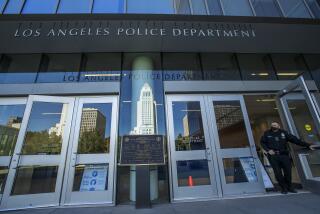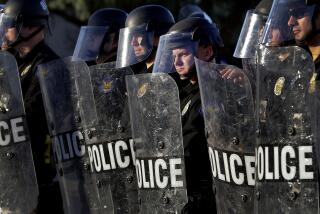Investigation Was an Eye-Opener for Christopher, Arguelles : Findings: The chairman and vice chairman were struck by how clearly race and economic standing govern the way certain officers treat civilians.
Not long after his commission embarked on its landmark investigation of the Los Angeles Police Department, Warren Christopher went on a “ride-along” with police officers. He asked for the Newton Division, a neighborhood he remembered from his days as vice chairman of the panel that investigated the Watts riots.
What he saw that night surprised him. No longer was this part of South Los Angeles--one of the city’s oldest black neighborhoods--predominantly black. It had become mostly Latino.
It was a telling lesson for this scion of the Los Angeles Establishment, a man with wide experience in public life: deputy attorney general, then deputy secretary of state, and now chairman of one of the city’s most respected law firms.
For Christopher, the last 100 days have provided a series of such lessons. Together, he and Vice Chairman John A. Arguelles--a former state Supreme Court justice with blue-ribbon credentials of his own--have taken a personal odyssey into a world that rarely touches their own.
Along the way, they discovered an ever-more complex, multicultural city. Ethnic populations keep shifting. Tensions exist between minority groups. Officers deal with immigrants whose deep fears of police in their own countries color their actions here. Residents speak more languages than the police can possibly learn.
“The single fact that most impressed me was the diversity,” both ethnically and in living conditions, Christopher said in an interview Monday afternoon but embargoed for release until today. “We all know this intellectually, but the experience on the commission brought (it) home.”
Given that, he said, he realized “how difficult it is to be the Police Department in this city, and how difficult it is to be the city government here.”
Christopher and Arguelles were struck to learn how clearly race and economic standing govern the way certain officers treat civilians.
In its five public hearings, the commission was bombarded with complaints, many from minority communities. Its chairman and vice chairman expected that. What they were not prepared for was finding that police officers felt at liberty to use patrol car computers to cast racial aspersions and make crude remarks about excessive force.
It left them, Arguelles said, with “the impression that racism and a cavalier attitude toward the use of force was not something that was being particularly concealed” by those making the remarks. The documentation became “quite convincing” and ultimately “quite discouraging.”
Arguelles predicted that finding would “prove chastening” to the Police Department’s leadership. It may have been especially disheartening for the retired jurist, who has a long history in the field of law enforcement. He had been asked by Police Chief Daryl F. Gates to head a separate inquiry into the Police Department--even before Mayor Tom Bradley named his own panel, with Christopher as chairman.
Almost immediately, Christopher and Arguelles decided to merge. But with Bradley and Gates publicly feuding, speculation held that so, too, would their representatives.
Both Christopher, a liberal Democrat, and Arguelles, a conservative Republican, maintain that that was not the case. They note that the commission was unanimous in all its recommendations, based on irrefutable data.
Yet subtle clues to their differences cannot help but poke through the surface of their very cordial relationship.
During the interview, for example, Arguelles recounted how the commission had received 8,000 pro-police letters. Christopher interjected that police officials, fearing the commission was “getting a skewed viewpoint,” had supplied those letters.
“John,” Christopher then asked politely, “does that accord with your recollection?”
“Yes, it does,” Arguelles replied.
The letters became another indicator of how race and economics affect perception of the Los Angeles Police Department. The letters, analyzed by ZIP code, were found to have come from such primarily white, affluent areas as the western San Fernando Valley.
In minority areas, even the clergy--whom Christopher had expected to be a voice of moderation--complained that parishioners have “a lack of confidence that they’ll be shown respect” by police.
Throughout the inquiry, both men said, they were acutely aware of the high expectations for their efforts. Arguelles talked of producing a report that would be seen as “visionary.”
Christopher, meanwhile, felt “a great sense of responsibility . . . I certainly was worried. I have been worried and I am worried”--about “doing an acceptable job, and helping rather than hurting.”
More to Read
Sign up for Essential California
The most important California stories and recommendations in your inbox every morning.
You may occasionally receive promotional content from the Los Angeles Times.









